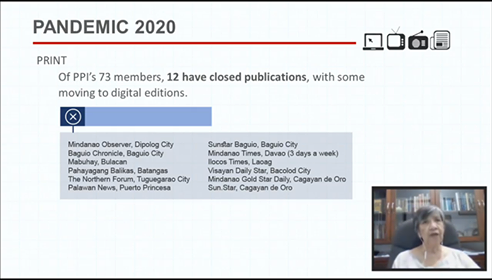
Center for Media Freedom and Responsibility (CMFR) Executive Director Melinda de Jesus talks about the situation of community media amid the pandemic as part of the events sanctioned by the Cebu media community as it marks the 28th Cebu Press Freedom Week.
CEBU CITY, Philippines — Amid the global economic downturn due to the coronavirus disease (COVID-19), media workers may have continued working but it didn’t mean they were exempt from the economic blows of the pandemic.
Melinda de Jesus, the executive director of the Center for Media Freedom and Responsibility (CMFR), discussed on Monday, September 21, 2020, the current struggle of the media industry, particularly the community media amid the pandemic.
De Jesus’ talk, which was carried on Facebook pages of the media companies in Cebu and the Cebu Citizens-Press Council (CCPC), is the first in a series of discussions on relevant issues in the media industry as the Cebu media community marks the 28th Cebu Press Freedom Week (CPFW) from September 20 to 27.
The observance of the CPFW is on the same week as the commemoration of the declaration of Martial Law on September 21, 1972.
According to De Jesus, the effect of the pandemic has proven to be existential with at least 12 community papers who are members of the Philippine Press Institute (PPI) that have ceased operations.
Some of these migrated to online operations while others have momentarily stopped.
“This is changing daily. There are updates on the PPI page how some of them are recognizing return to business [and] have felt that maybe they could try to sell again rotating from five days to three days, to two days, rotating their resources as best they can. The media product, of course, is always market sensitive. We are relying on advertising, based on circulation or on rating. It reflects therefore the general micro or macro prospects of the country’s economy,” de Jesus said.
‘The effect of the pandemic, therefore, is existential. The market is suffering from a recession causing huge losses in the news industry,” she added.
De Jesus, however, added that she is hopeful that the restart of the economy after months of lockdown will allow the smaller publications to eventually reopen as they shift to the online platform or publish in a hybrid of online and print set-up.
The non-renewal of the legislative franchise of ABS-CBN, on the broadcast media side, effectively closed down 21 regional network stations and rendered jobless over 500 personnel in the regions. The regional network group (RNG) are considered part of the community media since the regional stations focus their stories on local developments.
Another television network, De Jesus said, also resorted to retrenching employees even without impediments on their franchise.
Amid the challenges brought by the pandemic and despite the that the long term sustainability of stand-alone online publication is not yet certain, de Jesus said, the men and women in the media have to be ready to go to digital and simply hope for the best./dbs